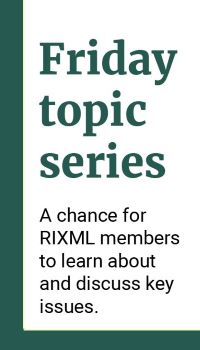What does it mean to implement the RIXML Research Standard?
The manner in which your firm implements the RIXML Research Standard will depend on where your firm is in the investment research chain:
Sell-side firms interested in implementing the RIXML Research Standard will need to:
- Update their publishing tools so that they produce RIXML tagging data as reports are published
- Ensure that their tagging policies include the RIXML "required" and "highly recommended" tags, minimizing use of the "PublisherDefined" option
- Validate their content against the standard
- Apply the RIXML Research Standard to their distribution models
Vendors will need to:
- Update their content ingestion protocols
- Update their applications to take advantage of RIXML tagging and enumeration lists
- standardize terms used to describe certain aspects of research, such as security type, region, etc. in accordance with RIXML defined terms
- Require content providers to adhere to the standard
Buy-side firms will need to:
- Work with technology vendors and/or internal systems developers to adopt the standard
- Require content providers to adhere to the standard
- Integrate the RIXML Research Standard into their investment process
Implementation Options
The RIXML Research Standard offers the ability enhance investment research with hundreds of tags, allowing the producers of investment research to describe each piece of investment research in great detail, and even to describe parts of their research reports in great detail. However, the RIXML organization recognizes that this can seem like an overwhelming task, and so has defined two levels of implementation:
Level One
The basic implementation of RIXML Research includes the tags that were identified by RIXML-member firms as the ones most critical to research. Level One is a subset of the full schema that represents a common starting point for introducing RIXML into a research platform. It includes the most important and most widely implemented tags. At a high level, the tags include:
- Time and date of publication
- Title, subtitle, abstract, synopsis
- Name of the author(s)
- Name of the publishing firm
- Publication status (released, revised, deleted)
- Product type (report, comment, model)
- Language
- Subject
- Reference to the research report (PDF, audio file, etc.)
- Issuers discussed, with cash flow, revenue
- Securities discussed, with rating, target price, estimates
- Sector/industry classifications
- Country or Region
- Intended audience
Supporting RIXML Research Level One involves providing tagging for the subset of tags identified in the Level One standard. This ensures that documents have the minimum amount of information identified by RIXML-member firms as essential. Not all tags will be used for all publications; for example, the RIXML file for an economic overview with no reference to any specific company will not include a SecurityID tag, even though SecurityID is a Level One tag – it just doesn't apply to that publication. However, in order to be RIXML Level One compliant, the RIXML file must include all level one tags that do apply for that publication. The absence of a Level One tag from a particular RIXML file will mean that although the publisher supports the tag, it determined that the most accurate, meaningful action for that particular RIXML file was to omit it.
Vendor products will be required to support all Level One tags whenever populated by a publisher. Level One tags will be part of the data model behind each vendor platform, and each tag will be available to end users in a meaningful way via the end user interface. Substantive participation will typically mean the ability of platform users to include the tag in searching and/or filtering criteria. Some tags may not be useful or meaningful in search actions, but are used by back-end systems to manage entitlements instead.
Note that any valid Level One RIXML instance document is a fully valid RIXML document. Level One includes all required tags, along with the optional tags that RIXML.org member firms defined as tags that are critical in describing investment research.
Full implementation
While Level One provides the ability to tag the information about what the report is about, the full implementation enables a larger degree of componentization – that is, the ability to tag discrete bits of information. When a research document is created, it is just a "brick" of information. Some publishers will find it helpful to componentize the information in the research report, pulling out information such as:
- Rating action
- Event details (event date, venue, etc.)
- Author’s contact information
There are hundreds of tags in the RIXML Research standard. The more tags a publisher adds, the more sophisticated a vendor can get, and the more targeted a user’s search results can be.
More details about implementing RIXML Research can be found in the RIXML Research User Guide.

